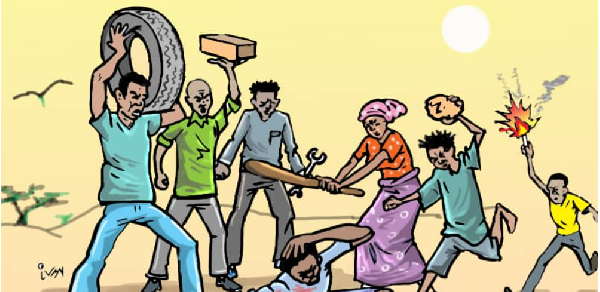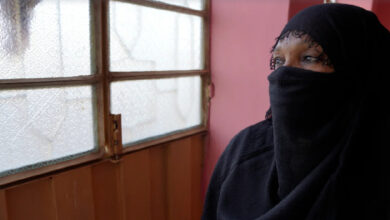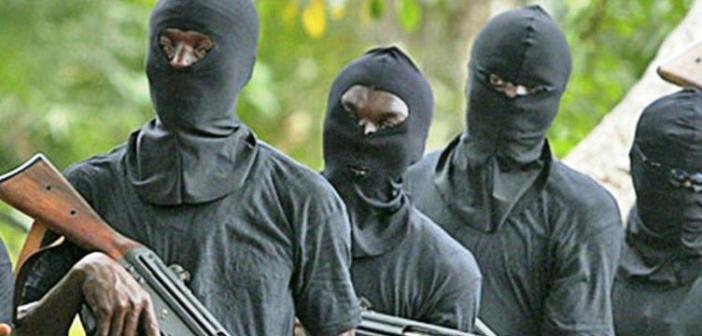Mob kills 10 suspects in two months in Bukedi

Local leaders, law enforcers, and human rights defenders have decried the rising cases of mob attacks in Bukedi North Sub-region, Eastern Uganda, with individuals suspected of theft being the most killed.
According to data compiled by the police, seven people were killed in March, and three more were killed in April of this year.
This publication has learned that most of the individuals killed are typically suspected of stealing cattle and motorcycles in the area.
The latest incident happened on Tuesday, April 29, 2025, when an unidentified man was lynched by unknown individuals and left on the roadside in Namengo village, Budaka town council in Budaka District.
According to police, the deceased was wearing green gumboots and carrying a panga. He was suspected of theft and beaten to death.
A team from Budaka CPS homicide visited the scene, took photos, retrieved the body and conveyed it to Budaka Health Centre IV for a postmortem.
The police have repeatedly condemned mob attacks, stressing that they frustrate investigations because most of the crucial evidence is lost in such attacks.
Another mob attack case was reported in Kibuku District, where a suspected livestock thief was killed on April 26.
According to Bukedi North Regional Police spokesperson ASP Wilfred Kyempasa, the deceased, identified as Musa Kalenzi, 38, a peasant from Bukalijo Cell, Tirinyi Town Council in the same district, was allegedly caught with a stolen sheep around 5:30 a.m. in Bulalaka Village.
“It is alleged that the deceased was found in possession of a sheep he could not account for. Residents who knew him as a suspected habitual thief mobilised and beat him to death,” ASP Kyempasa said.
Detectives from Kibuku Central Police Station responded to the scene, where they recovered a brown sheep tied to the deceased’s leg and a damaged mobile phone. Mob attacks in the sub-region are common, partly due to corruption and laxity among law enforcers, according to human rights activists.
In 2024, this publication reported that mob attacks left at least 21 people killed in Bukedi in nine months.
According to police statistics, 21 cases of mob action were recorded between January and October 2024, with Budaka District leading with 11 cases, followed by Pallisa (5), Kibuku (3), and Butebo (2).
The article highlights that the victims were primarily suspected of offences such as theft, robbery, murder, witchcraft, and burglary.
Police officials attribute the rise in mob justice to factors like ignorance of the justice system, lack of trust in law enforcement, and frustrations over perceived judicial leniency.
For instance, suspects being granted bail despite evidence has led to community disillusionment.
SP Samuel Semewo, the former Bukedi North regional Police spokesperson, emphasized the importance of upholding the principle of presumption of innocence and allowing police to conduct proper investigations.
The Budaka County MP, Arthur Wako Mboizi, criticized weak laws and called for harsher penalties for petty offenders to deter mob justice.
Ms Harriet Chebet, a human rights defender, condemned the act, cautioning the public against taking the law into their own hands.
“Mob attack remains a major challenge in Uganda, particularly in rural areas where frustrations over delayed justice often lead to violent retaliation,”Ms Chebet said.
She urged communities to report suspects to authorities rather than resorting to violence.
Kyempasa said several people who participated in the mob have been arrested and charged.
Mr Joseph Nagwere, a retired teacher, also attributed the increasing cases of mob justice in the region and Uganda at large to several interconnected factors like lack of trust in the justice system.
“When people feel that the formal legal system is slow, corrupt, or ineffective, they may resort to taking matters into their own hands. If the public believes that suspects won’t face consequences through legal channels, they may feel justified in delivering their form of justice,” Mr Nagwere said.
He said that rising incidents of theft, especially of valuable items like cattle and motorcycles, can fuel anger and frustration in communities, given that they are some of the main source of income in most rural communities these days.
“When crime goes unpunished or is perceived to be increasing, people may resort to mob justice as a way of deterring further criminal activities. In some areas, there may be insufficient police presence or inadequate response to crimes. The lack of law enforcement may create an environment where people feel they must act themselves to maintain safety and order,” he said.
Mr David Okwi, a human rights activist, said that in some communities, traditional forms of justice, such as village courts or communal decision-making, can be easily misused or distorted into mob justice.
“When crimes are committed, especially violent ones, emotions can run high. The desire for immediate retribution, particularly in cases involving theft or violence, can lead to people taking the law into their own hands,” Mr Okwi said.
He said addressing mob attacks requires building trust in the justice system, strengthening law enforcement, and creating public awareness campaigns about the dangers of taking justice into one’s own hands.
The latest police annual crime report showed that by the end of 2024, a total of 1,016 cases of murder by mob action were reported to the police, compared to 1,039 cases reported in 2023, giving a decrease of 2.2 percent in this crime category. The report shows that a total of 1,016 persons were lynched, out of whom 1,078 were male adults, and 20 were female adults.
By the end of 2024, Luwero District registered the highest number of murders by mob action (22 cases), followed by Old Kampala Police Division with 20 cases, Mpigi with 19 cases, Kakumiro and Buikwe with 18 cases each.
Source: monitor.co.ug





